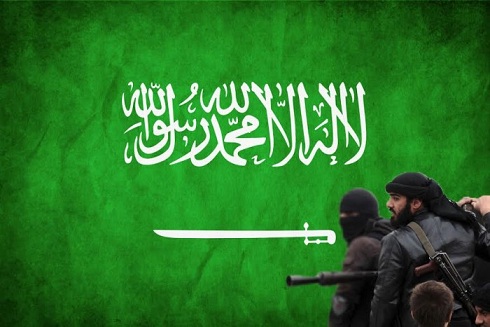Among the 611 groups blacklisted by the US Department of State as terrorist entities, a majority is inspired and even nurtured by Wahhabism, bankrolled by Saudi Arabia, and regard the Shiites, Iran, and the West as they main enemies.
The bonds between the Saudi Arabian rulers and Wahhabi clerics date back to long years ago, when the Saudi monarchy was emerged. At that time Muhammad bin Saud, who is considered the founder of the Saudi state, and Muhammad ibn and al-Wahhab, the 18th century Arab Peninsula mufti, agreed a deal that fused religion and tribal system to produce legitimacy for establishing a governing structure.
The clergy, who promoted the idea that they get their power and legitimacy from the divine sources, agreed to entrust power to the Al Saud political rulers and in return receive the government guarantees against any threats of possible prosecution.
The Wahhabism should be differentiated from the Takfiri Salafism. It is connected to the Saudi throne through unbreakable bonds, and so is far from having a Takfiri nature. In fact, the ruling Al Saud family is taking a middle course between boosting strong economic and political relations with the West on the one hand and addressing the demands of the conservative Wahhabi clergy on the other hand. One way for the Saudi leaders to appease Wahhabism is turn a blind eye to Wahhabi deployment of terrorism and support for Takfirism in South Asia, West Asia, and even the Western world
On the other side, Riyadh pays millions of dollars in appeasement to the American public media to make sure not to unveil the true color of the kingdom as a state sponsor of terrorism. Even more, the Saudi leaders struggle to paint their monarchy as unrelated to terror incidents across the Muslim world. Their final aim is not only to clear themselves of terror sponsorship but also of radicalism.
But these efforts have so far failed to yield the desired results for the Saudis. For instance, the US Congress in July 2016 published the redacted “28 pages” of the 9/11 attacks report, detailing the links of the Saudi state to the hijackers. It affirmed that not only the ordinary Saudi citizens raised funds for the terrorists but also the Saudi government itself had hands in funding them. But Riyadh questioned the report’s veracity, claiming that Saudi Arabia is already engaged in battling extremism.
A majority of the terrorist assaults taking place inside Saudi Arabia predominantly hit Shiite minority's places in the Eastern province, as well as Western targets. The website of the Department of State warns the American nationals travelling to Saudi Arabia to “avoid places where the members of Shiite-Muslim minority gather.”
But why do the Americans keep supporting the terror-sponsoring Saudi state? The answer to this question might be found apparently in the former US President Barack Obama’s reply to the question of the Australian Prime Minister Malcolm Turnbull. PM Turnbull in a meeting with the Obama asked "aren't the Saudis your friends?”, only to get this from the president:” it’s complicated.”
How can Saudi Arabia be a good partner in battle against terrorism while its domestic security is tied to unceasing transport of terrorism? Well, simply Washington closes eyes to Riyadh’s actions in exchange for huge interests coming from the kingdom.
Zalmai Khalilzad, the former US ambassador to Afghanistan, has recently published an article in the Politico.com, claiming that the Saudis “are coming clean” on funding the terrorist groups. He said during a recent trip that took him to the kingdom, a Saudi official told him that “we misled you”, and that Riyadh formerly funded the radicals but now terrorism turned against it and so it began to avoid doing so.
The Saudi official’s confession comes while the American intelligence agencies still underscore the notion that Saudi Arabia and Qatar secretly fit out ISIS and al-Qaeda terrorist groups in Syria and Iraq and even elsewhere with financial aids and logistics.
/106

